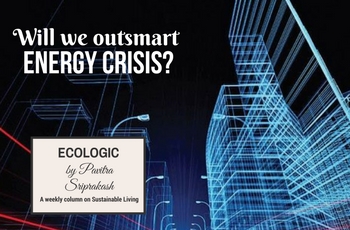05 Aug 2017, New Indian Express: ECOLOGIC- Pavitra Sriprakash, the Chief Designer and Director of Shilpa Architects writes about “Smart” recycling.
Read Full Article:
Will we outsmart energy crisis?
Author: Pavitra Sriprakash, Chief Designer and Director of Shilpa Architects Planners Designers
We are nowadays unbelievably crazy about all things ‘smart’ — from phones to cities. One of the new ‘smart’ fads is the smart highway. It incorporates solar energy and new technologies to monitor and fuel vehicles sustainably. Another is the smart autonomous car, which is equally disruptive. Silicon Valley innovators have taken the lead over Stuttgart and Aichi for pushing at the frontiers of driverless electric powered AI controlled transport. As sales of diesel cars decline, environmentalists gleefully write epitaphs for the internal combustion engine. Travel is set to take incredulous strides into unrecognizable realms by 2030.
Smart roadways made their appearance six months ago, when France unveiled the world’s first solar panel road. It is a 1km route in Normandy embedded with 2,800 sqm of electricity-generating panels. Studies planned for the next two years will provide data about pay back periods, energy efficiencies and wear and tear of panels. Their results will pave the path for the future of road design. Efficient power generation by photovoltaic cell arrays capable of charging moving cars will surely involve rapid technological shifts. First applications of these emerging trends in driveways and parking lots are expected to go mainstream soon.
India has the second largest road network in the world and abundant sunshine for over 300 days a year. It is easy to be early adopters, and we could be completely drawn to the concept of smart roads. The French built their first smart road in a village of 3400 people, and it generates enough energy to power streetlights. The scale is incomparable, but one cannot ignore the possibilities for this technology in electricity-starved India.
Apart from the big price tag there are hurdles like low efficiencies of power generation, pilferage of panels and incessant digging of roads by municipalities to deter us from adopting this technology at home.
Everywhere power generation and distribution businesses are dominated by public utility giants whereas cheaper and cleaner solar energy producers are in the nimble private sector. It is hard to manage the transition to a carbon-free sustainable future promised by smart roads and electric cars, as many generating technologies, clean and dirty, need to remain profitable.
Reconciling their opposing business interests in the intervening period is going to pose huge environmental and socioeconomic challenges globally. Meanwhile, a homegrown smart road intervention is the quick adoption of plastic in roads as legislated in 2015. Prof. Vasudevan from Thiagarajar College of Engineering, Madurai, patented a technology for blending recycled plastic in bitumen. Trashed plastic bottles, bags, disposable cups and cutlery, styrofoam and flexible film are shredded into strands for this purpose.
It is cheaper to construct plastic fiber reinforced roads, as the eco-friendly and non-toxic alternative requires reduced quantities of bitumen. The binding properties of the plastic makes bitumen roads more abrasion resistant and water repellant, thereby retarding pothole formation and degradation. Over one lakh kilometer of roads in 11 states are being laid with this material.
So, what is smart for one may not prove so immediately smart for the other. Till solar roads are cheap, reliable and efficient, let us focus on making our roads smarter with recycled plastic. Au revoir!
Click here for PDF | Click here for the Link to the New Indian Express Site



